-
 bitcoin
bitcoin $87959.907984 USD
1.34% -
 ethereum
ethereum $2920.497338 USD
3.04% -
 tether
tether $0.999775 USD
0.00% -
 xrp
xrp $2.237324 USD
8.12% -
 bnb
bnb $860.243768 USD
0.90% -
 solana
solana $138.089498 USD
5.43% -
 usd-coin
usd-coin $0.999807 USD
0.01% -
 tron
tron $0.272801 USD
-1.53% -
 dogecoin
dogecoin $0.150904 USD
2.96% -
 cardano
cardano $0.421635 USD
1.97% -
 hyperliquid
hyperliquid $32.152445 USD
2.23% -
 bitcoin-cash
bitcoin-cash $533.301069 USD
-1.94% -
 chainlink
chainlink $12.953417 USD
2.68% -
 unus-sed-leo
unus-sed-leo $9.535951 USD
0.73% -
 zcash
zcash $521.483386 USD
-2.87%
What does it mean that both ARBR popularity and willingness indicators fell below 50? Has the market sentiment reached its freezing point?
The ARBR indicators dropping below 50 reflects weakening market sentiment, signaling hesitation and potential bearish momentum in cryptocurrency trading.
Jun 20, 2025 at 05:36 pm
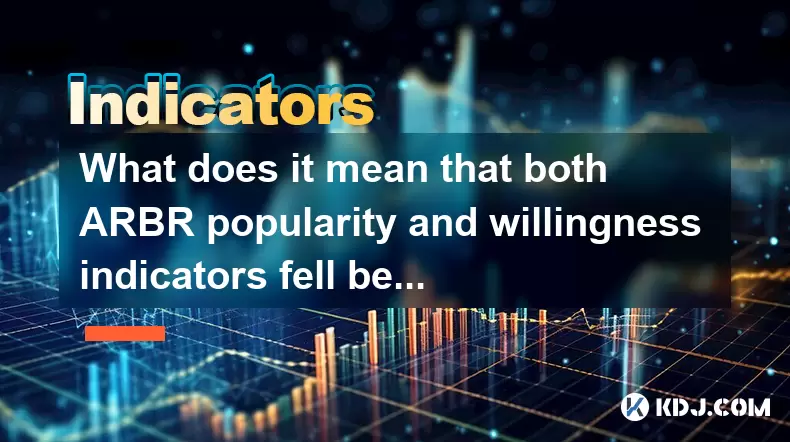
Understanding the ARBR Indicators in Cryptocurrency
In the world of cryptocurrency trading, technical indicators play a crucial role in assessing market conditions. One such set of indicators is ARBR, which stands for Acceptance Ratio (AR) and Behavior Ratio (BR). These two components work together to reflect market sentiment and trader behavior.
The AR value typically measures how well prices are accepted by traders at different levels, while the BR value reflects buying and selling pressure over time. When both values fall below 50, it suggests that market participants are becoming hesitant or even bearish. This decline indicates that buying pressure is weakening, and the acceptance of current price levels is low, potentially signaling a cooling down in interest.
Why a Drop Below 50 Is Significant
A reading below 50 for either the AR or BR indicator is often viewed as a cautionary signal. However, when both fall below this threshold simultaneously, it can be interpreted as a strong warning sign. Historically, such occurrences have coincided with periods of uncertainty, sharp corrections, or even bearish trends in crypto markets.
This phenomenon may suggest that:
- Traders are not willing to buy at current prices
- Selling pressure is increasing
- Market confidence is declining
It's important to note that while these indicators are powerful tools, they should not be used in isolation. They must be analyzed alongside other metrics like volume, order book depth, and macroeconomic factors.
How ARBR Interacts With Market Sentiment
Cryptocurrency markets are highly influenced by sentiment, which can shift rapidly due to news events, regulatory changes, or macroeconomic developments. The ARBR indicator serves as a proxy for collective trader psychology. A drop below 50 on both fronts implies that market optimism has significantly diminished.
For instance:
- If the AR drops below 50, it could mean that recent rallies are not being supported by strong buyer demand
- If the BR also falls below 50, it signals that short-term momentum is fading, and traders are reluctant to push prices higher
These combined movements often precede consolidation phases or further downside corrections.
Technical Interpretation of Low ARBR Readings
From a technical standpoint, ARBR readings below 50 can be broken down into key observations:
- AR : Buyers are no longer absorbing sell orders effectively, suggesting weakness in bullish conviction
- BR : Sellers are gaining control, indicating increasing bearish influence
- Both falling together: Suggests a loss of momentum across both buyers and sellers, potentially leading to sideways or downward movement
Traders often use candlestick patterns and support/resistance zones to confirm whether a low ARBR reading will result in a significant trend change.
Historical Context: Past Instances of ARBR Dips Below 50
Looking back at previous cycles, there have been several occasions where both AR and BR dropped below 50, especially during major market corrections. For example:
- During the 2018 crypto winter, both ARBR indicators remained below 50 for extended periods
- In early 2022, amid rising inflation fears, ARBR dipped below 50 before a prolonged bear phase
These instances highlight that while a drop below 50 doesn’t always guarantee a crash, it does indicate weakening market structure and often precedes increased volatility.
What Traders Should Watch For Next
If both AR and BR remain below 50, traders should closely monitor the following:
- Price action near key support levels
- Volume spikes or drying up liquidity
- Divergences between price and oscillator readings
Additionally, cross-checking with other sentiment gauges like the Crypto Fear & Greed Index or on-chain data can provide more context about whether the market is truly 'frozen' or just consolidating.
Frequently Asked Questions
Q: Can ARBR stay below 50 for long periods without a major market crash?Yes. While a reading below 50 indicates weakness, prolonged consolidation without panic selling can keep ARBR low without triggering a crash. It’s more of a warning than a prediction.
Q: Are ARBR indicators reliable for altcoins as well as Bitcoin?Absolutely. While originally developed for traditional markets, ARBR works effectively across most cryptocurrencies, including altcoins. However, due to their higher volatility, altcoins may show more erratic swings in ARBR readings.
Q: How do I integrate ARBR into my existing trading strategy?You can use ARBR as a sentiment filter. For example:
- Only take long positions when AR > 50 and BR > 50
- Avoid trades when both are below 50 unless you’re a contrarian
- Combine with moving averages or RSI for confirmation
Q: Is there a way to visually interpret ARBR on a chart?Most modern trading platforms, including TradingView and Binance's advanced charting tools, offer ARBR as an overlay indicator. You’ll typically see two lines:
- AR line (usually red)
- BR line (usually blue)
Watch for crossovers, divergences, and threshold crossings at the 50 level to make informed decisions.
Disclaimer:info@kdj.com
The information provided is not trading advice. kdj.com does not assume any responsibility for any investments made based on the information provided in this article. Cryptocurrencies are highly volatile and it is highly recommended that you invest with caution after thorough research!
If you believe that the content used on this website infringes your copyright, please contact us immediately (info@kdj.com) and we will delete it promptly.
- Ethereum Poised for Rally as Longs Consolidate Amidst Market Volatility
- 2026-02-02 16:00:02
- ETH Transfer Sparks Panic Selling, Wipes Out Trader in Major Crypto Shake-Up
- 2026-02-02 15:40:01
- Ethereum's High-Stakes Dance: Bull Trap or Supercycle Launchpad?
- 2026-02-02 16:05:01
- Bitcoin’s Wild Ride: Crypto Market Faces Price Drop Amidst Extreme Fear and Macro Headwinds
- 2026-02-02 12:30:01
- Bitcoin Price: Jim Cramer's $82K Recovery Forecast Ignites Market, Pitting Saylor Speculation Against the 'Inverse Cramer' Effect
- 2026-02-02 15:55:01
- Ross Stores Dominates Off-Price Retail with Brick-and-Mortar Prowess Amidst Economic Shifts
- 2026-02-02 13:20:01
Related knowledge
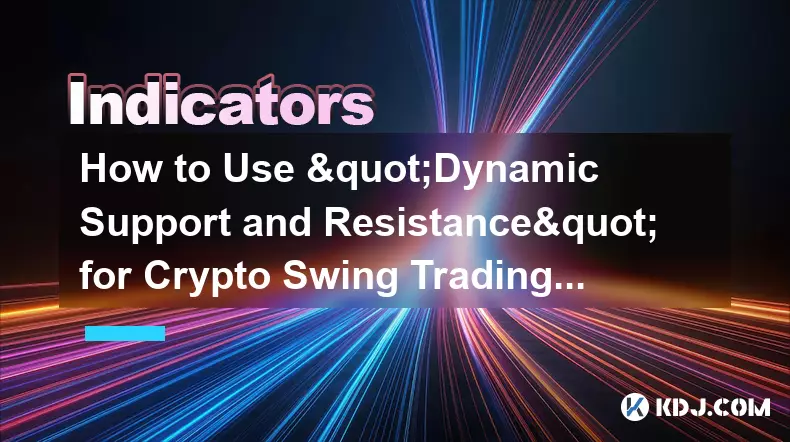
How to Use "Dynamic Support and Resistance" for Crypto Swing Trading? (EMA)
Feb 01,2026 at 12:20am
Understanding Dynamic Support and Resistance in Crypto Markets1. Dynamic support and resistance levels shift over time based on price action and movin...
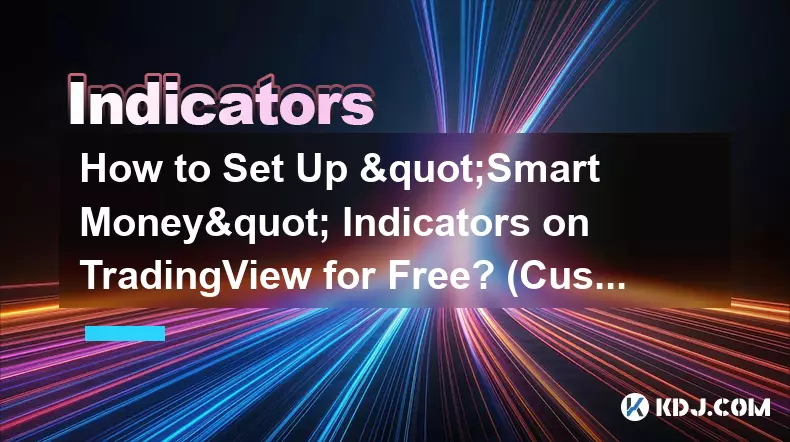
How to Set Up "Smart Money" Indicators on TradingView for Free? (Custom Tools)
Feb 02,2026 at 03:39pm
Understanding Smart Money Concepts in Crypto Trading1. Smart money refers to institutional traders, market makers, and experienced participants whose ...
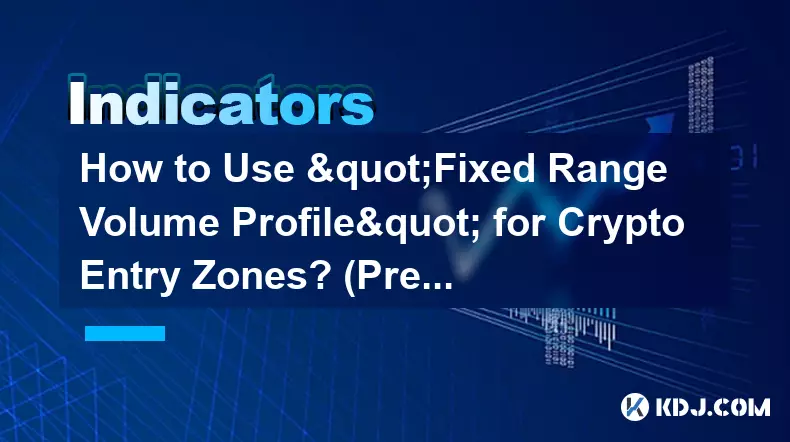
How to Use "Fixed Range Volume Profile" for Crypto Entry Zones? (Precision)
Feb 01,2026 at 10:19pm
Understanding Fixed Range Volume Profile Mechanics1. Fixed Range Volume Profile (FRVP) maps traded volume at specific price levels within a defined ti...
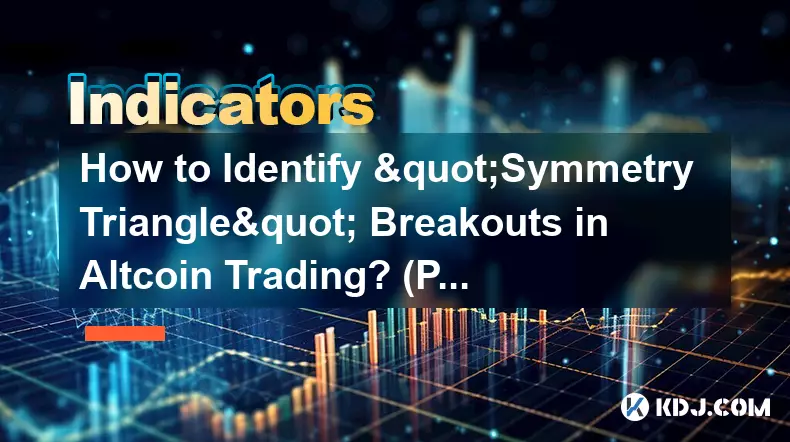
How to Identify "Symmetry Triangle" Breakouts in Altcoin Trading? (Patterns)
Feb 01,2026 at 01:39pm
Symmetry Triangle Formation Mechanics1. A symmetry triangle emerges when price action consolidates between two converging trendlines—one descending an...
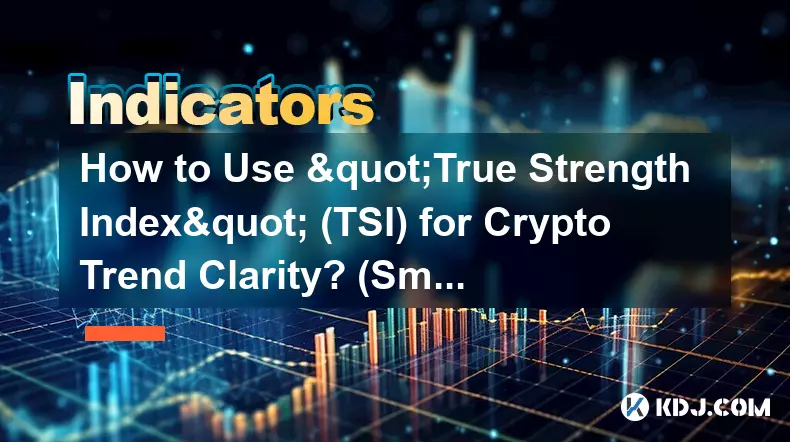
How to Use "True Strength Index" (TSI) for Crypto Trend Clarity? (Smoothing)
Feb 02,2026 at 01:40pm
Understanding TSI Fundamentals in Cryptocurrency Markets1. The True Strength Index (TSI) is a momentum oscillator developed by William Blau, built upo...
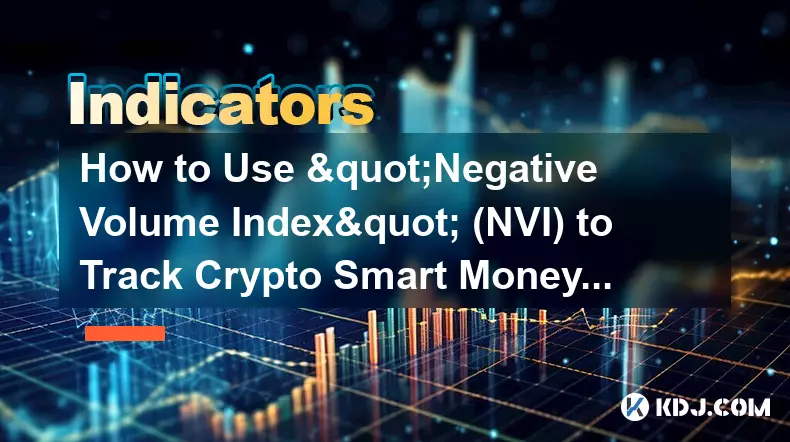
How to Use "Negative Volume Index" (NVI) to Track Crypto Smart Money? (Pro)
Feb 01,2026 at 02:40am
Understanding NVI Mechanics in Crypto Markets1. NVI calculates cumulative price change only on days when trading volume decreases compared to the prio...

How to Use "Dynamic Support and Resistance" for Crypto Swing Trading? (EMA)
Feb 01,2026 at 12:20am
Understanding Dynamic Support and Resistance in Crypto Markets1. Dynamic support and resistance levels shift over time based on price action and movin...

How to Set Up "Smart Money" Indicators on TradingView for Free? (Custom Tools)
Feb 02,2026 at 03:39pm
Understanding Smart Money Concepts in Crypto Trading1. Smart money refers to institutional traders, market makers, and experienced participants whose ...

How to Use "Fixed Range Volume Profile" for Crypto Entry Zones? (Precision)
Feb 01,2026 at 10:19pm
Understanding Fixed Range Volume Profile Mechanics1. Fixed Range Volume Profile (FRVP) maps traded volume at specific price levels within a defined ti...

How to Identify "Symmetry Triangle" Breakouts in Altcoin Trading? (Patterns)
Feb 01,2026 at 01:39pm
Symmetry Triangle Formation Mechanics1. A symmetry triangle emerges when price action consolidates between two converging trendlines—one descending an...

How to Use "True Strength Index" (TSI) for Crypto Trend Clarity? (Smoothing)
Feb 02,2026 at 01:40pm
Understanding TSI Fundamentals in Cryptocurrency Markets1. The True Strength Index (TSI) is a momentum oscillator developed by William Blau, built upo...

How to Use "Negative Volume Index" (NVI) to Track Crypto Smart Money? (Pro)
Feb 01,2026 at 02:40am
Understanding NVI Mechanics in Crypto Markets1. NVI calculates cumulative price change only on days when trading volume decreases compared to the prio...
See all articles










































































